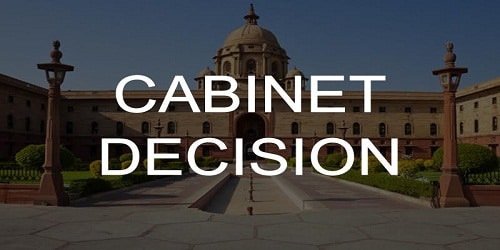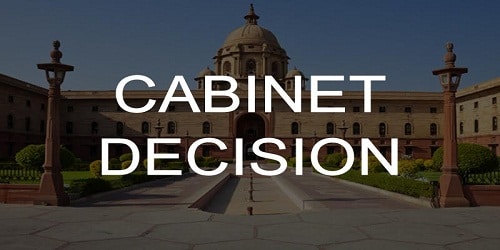On 15th April 2019, the Union Cabinet chaired by Prime Minister Shri Narendra Modi has given its approval on various proposals and schemes. The details of the cabinet approvals are stated as under:
 Cabinet approves creation of a single post of Deputy Comptroller and Auditor General in the office of Comptroller and Auditor General of India
Cabinet approves creation of a single post of Deputy Comptroller and Auditor General in the office of Comptroller and Auditor General of India
The Union Cabinet, chaired by the Prime Minister Narendra Modi, has given its approval for the creation of 1 post of Deputy Comptroller & Auditor General (Coordination, Communication and Information System).
Key Points:
- The Ministry of Finance stated that the position in Pay Level-17 was created by abolishing 1 STS level post in the Office of the Comptroller & Auditor General of India.
- At present, India’s top auditor has 5 posts for deputy CAGs. Their scope of work is inclusive of government’s accounts, central revenue audit, defence and railways, commercial and reports of central, communications and information systems.
- The official release notified that the Deputy Comptroller & Auditor General shall oversee the coordination among State Audits, audit of telecommunication and coordinate the various Information Systems (IS) initiatives within the Indian Audit & Accounts Department (IA&AD).
- The expenditure on account of creation of this post will be around Rs 21 lakh.
About current CAG:
- The CAG is mentioned in the Constitution of India under Article 148 – 151.
- The current CAG of India is Rajiv Mehrishi. He’s the 13th CAG of India and assumed office on 25 September 2017.
Cabinet approves the Continuation of Phase 4 of (GSLV) Geosynchronous Satellite Launch Vehicle
On 15th April, the Union Cabinet, chaired by the Prime Minister Shri Narendra Modi, has given the approval for ongoing GSLV continuation programme Phase-4 that consists of 5 GSLV rocket flights during 2021-2024.
Key Points:
- The GSLV Programme- Phase 4 will enable the launch of 2 tonne class of satellites for geo-imaging, navigation, data delay communication and space sciences.
- The total fund requirement for the phase 4 programme is Rs 2,729.13 crore. This amount includes the cost of 5 Geosynchronous Satellite Launch Vehicles (GSLVs), addition of essential facility, programme management, launch campaign and extra funds required to meet the scope of the programme.
- The ongoing GSLV programme will meet the launch requirement of satellites (at a frequency up to 2 satellite launches every year) for providing critical satellite navigation services, data relay communication for supporting the Indian Human Spaceflight Programme, the next mission to Mars.
- It will also ensure the maximum participation (in terms of production) by the Indian industry.
- All the operational flights would be completed during the period 2021-24.
Paramount Impact on India:
The functional state of the ongoing GSLV programme i.e. the capability of the launch of 2-tonne class of satellites has made India self-reliant in the field of communication & meteorological satellites, thus paving way to launch of similar satellites for national requirements.
About GSLV Continuation Programme:
- The major outcome of the GSLV Continuation Programme for India is the mastering of the highly complex ‘Cryogenic Propulsion Technology‘. This is an important technology that aids to the launching of the communication satellites to Geosynchronous Transfer Orbit (GTO). This has made way for the development of a high thrust Cryogenic engine for the next generation launch vehicle i.e. GSLV Mk-lll.
- On 19th December 2018, with the successful launch of GSLV-F11, (with the Cryogenic Upper Stage) GSLV has successfully orbited 10 national satellites, thus establishing itself as a reliable launch vehicle for aforementioned missions.
- First sanctioned in 2003, the GSLV Continuation Programme has completed 2 phases. Now the 3rd phase is in progress and is expected to be completed by the fourth quarter of 2020-21.
The Cabinet Committee on Economic Affairs has approved extension of duration of New Urea Policy-2015 (from 1st of April, 2019) for existing gas-based urea unit
The Cabinet Committee on Economic Affairs, chaired by Prime Minister Shri Narendra Modi has given approval for the proposal of the Department of fertilizers for extension of the duration of New Urea Policy-2015 for existing gas-based area unit from April 1, 2019 until further orders.
Key Points:
- The prime objective of this policy is to promote energy efficiency in urea production, maximise facilitation of operations and regular supply of urea to the farmers, and rationalizing subsidy burden on the government.
- Presently, in India there are 31 urea units of which 28 units are gas-based and the rest 3 units use naphtha as feedstock.





